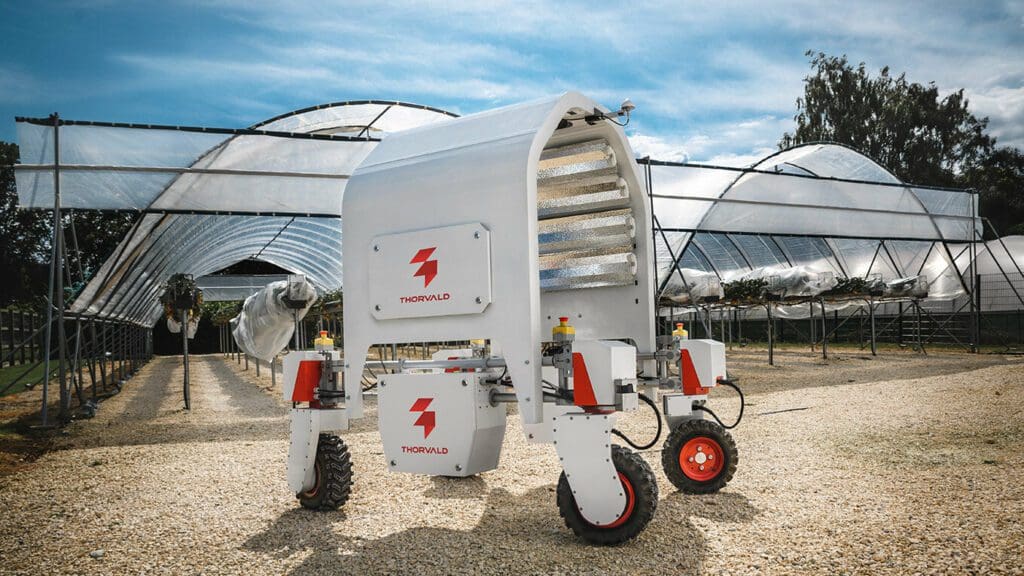Would you like to get notifications from Christian?
The future of farming is here, and agricultural robots drive it. These advanced machines are designed to provide chemical-free treatments to plants, ensuring healthier crops and a more sustainable approach to agriculture. By utilizing cutting-edge technology, these robots offer an innovative solution to the challenges faced by traditional farming methods, paving the way for a brighter and more eco-friendly future.
Autonomous robots are making waves in the AGtech world. Combining efficiency, productivity, and innovation, these robots are an essential part of the ongoing evolution of precision farming. They present a disruptive alternative to conventional practices, often relying on harmful chemicals to protect crops from pests and diseases.
Norwegian company Saga Robotics has developed a groundbreaking farming-as-a-service platform called Thorvald. Thorvald uses all-electric autonomous agricultural robots to treat crops for powdery mildew, a disease that can reduce a vineyard's crop of grapes by up to 45% in a single season. Traditionally, growers would combat this loss by spraying their vines with fungicides up to 15 times per summer. However, with Thorvald's innovative robots, farmers can protect their crops without chemicals.
By adopting all-electric autonomous agricultural robots, farmers can enjoy a plethora of exciting opportunities. These advanced machines provide a healthier, more eco-friendly solution to crop protection and revolutionize how we approach agriculture.
Thorvald's all-electric agricultural robots use shortwave ultraviolet light (UV-C) to deactivate powdery mildew on plants. This treatment is applied at night for maximum effectiveness, allowing growers to focus on other important daily tasks. Currently approved for use on strawberries and grapes, Saga Robotics is also working on developing other light treatments for additional crops.
These electric robots are modular and can be easily modified by farmers using simple hand tools. Available in three configurations, they are suitable for use in polytunnels, vineyards, and open fields. As part of the farming-as-a-service platform, farmers receive field mapping, an entire season of light treatments, and access to live data feeds from the robots.
As all-electric autonomous robots become more prevalent, we can expect significant changes in how we produce and consume food. We can work together to create a more sustainable and prosperous world by embracing these advanced machines.

All-Electric Autonomous Agricultural Robots
The widespread adoption of all-electric autonomous agricultural robots can decrease chemical usage across the industry. This shift will result in a cleaner environment, healthier food for consumers, and a healthier farming lifestyle.
The introduction of all-electric autonomous agricultural robots also has the potential to stimulate economic growth. By increasing crop yields and reducing the need for harmful chemicals, this technology can help farmers become more profitable. This economic boost can improve people's lives worldwide and create new jobs in the tech and agriculture sectors.
As we continue to explore the incredible potential of all-electric autonomous agricultural robots, it's essential to recognize the impact they can have on our planet and our society. By harnessing the power of this technology, we can build a brighter, more sustainable future for all.
Author: Christian Kromme
First Appeared On: Disruptive Inspiration Daily
Do you want more of this kind of content? Subscribe to my 'Disruptive Inspiration Daily' newsletter. Do you find this content inspiring? Give it a 'like' or share the article with your network. This will help you and your network have a relevant timeline.
Which keynote best fits your needs?


Christian is a futurist and trendwatcher who speaks about the impact of exponential technologies like AI on organizations, people, and talents. Christian tailors his presentations to your audience's specific industries and needs.



Our world is changing at an exponential rate! A big tidal wave of digital transformation and disruption is coming at us fast. Many organizations see this wave as a threat and experience stress, but there are also organizations that just see this wave as an opportunity.

Imagine sitting with just 10-15 fellow executives at a premier location, gaining clarity on the impact of AI on your industry while enjoying an exquisite dining experience. These are not just meetings—they are transformative moments that will shape the future of your organization



In the future, 3D printing and generative design will allow for products to be designed in a more decentralized manner, and production will take place closer to the customer and fully on-demand. 3D printing technology will also allow for more customization and personalization of products.


The agricultural industry is ripe for disruption. Robotics, AI, and IoT are all technologies that have the potential to radically transform the way we grow food. In combination with vertical farming, these technologies could increase the efficiency and quality of agricultural products.

A human-centered society is one that puts people first and where technology is used to unite and empower people. It is a society that values biological life and dignity above all else. It is a society that recognizes the importance of human relationships and works to strengthen them. In a human-centered society, all members of the community are valued and treated with respect.


The future of healthcare is here. New technologies like AI, IoT, big data, and smart sensors make it possible to become the CEO of your own health. Imagine that your phone can listen to your voice and AI algorithms can detect small nuances in the tone of your voice that indicate specific diseases.
